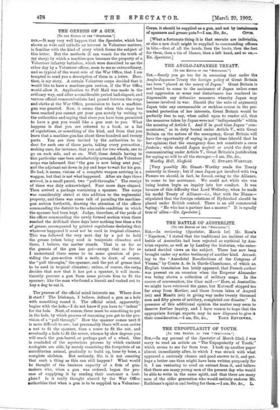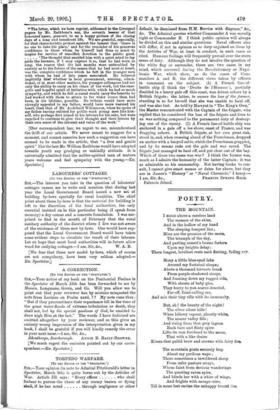THE UNPOPULARITY OF YOUTH.
[To Till EDITOR OT TEE " SPICTATOR.".1 SIR,—In my perusal of the Spectator of March 22nd, I was sorry to read an article on " The Unpopularity of Youth," which seems to me far from true. I took up another paper almost immediately after, in which I was struck with what appeared a curiously chance and good answer to it, and per- haps a better one than might have been written purposely for it. I am venturing to send an extract from it, and believe that there are many young men of the present day who would be able to write in the same spirit, and that there are many men of the older generation who would entirely endorse Mr. Rathbone's opinion and feeling for them.—I am, Sir, &c., L.
The letter, which we here reprint, addressed to the Liverpool papers by Mr. Rathbone's son, the seventh bearer of that honoured name, presents to us a happy picture of the closing days of a long and beneficent life. We are grateful, especially, for that characteristic protest against the lament that there is no one to take his place,' and for the reminder of his generous confidence in those whom be himself had done so much to inspire for service of unselfish devotion to the public good.
The thought that enabled him with a quiet mind to lay aside the harness, if I may express it so, that he bad worn so long, the reason that the last months were untroubled by anxiety as to the future of the causes that he had most at heart, was the complete confidence which he felt in the younger men with whom he had of late years associated. He believed implicitly that whether in local government, nursing, educa- tional, or in most other matters, his younger colleagues had not only the ability to carry on his share of the work, but the ener- getic and hopeful spirit of initiative with which he had so much sympathy, and which he felt assured would carry the benefits he had worked with them to attain to far wider issues than had been, in his lifetime, possible. No tribute would have more strongly appealed to my father, would have more warmed his heart, than that of Mr. Archibald Williamson, when he spoke of my father having enlisted for public work young men like him- self, who perhaps first joined in his labours for his sake, but were impelled to continue to give their thought and their leisure by their own sense of the interest and value of the work."
[Our correspondent has, we regret to see, misunderstood the drift of our article. We never meant to suggest for a moment, and cannot conceive how such a suggestion can have seemed to be made in the article, that " a free and gentle spirit " like the late Mr. William Rathbone would have adopted towards youth any grudging or unkindly attitude. It is universally admitted that the nobler-spirited men of mature years welcome and feel sympathy with the young.—ED.
Spectator.]







































 Previous page
Previous page